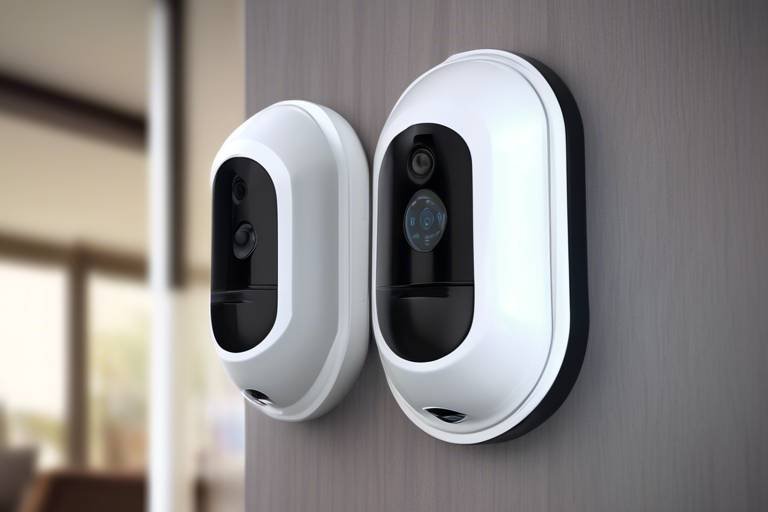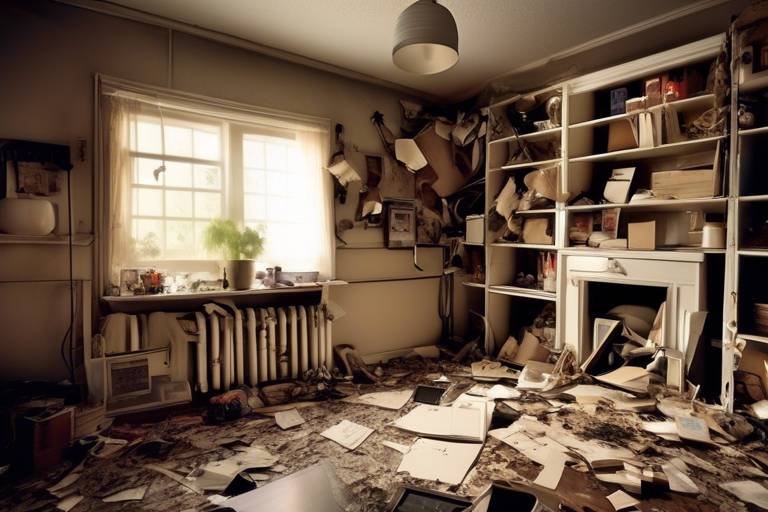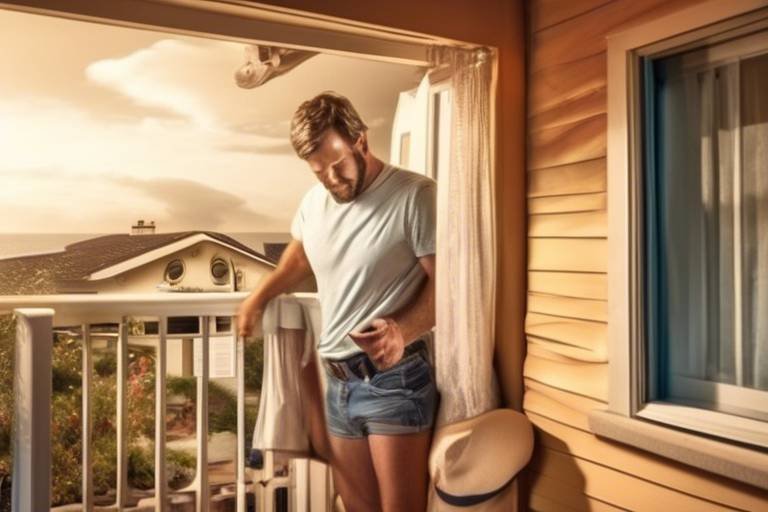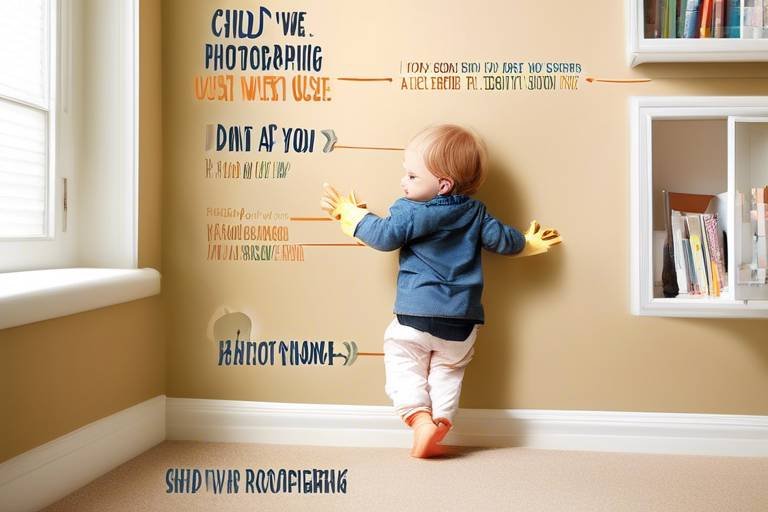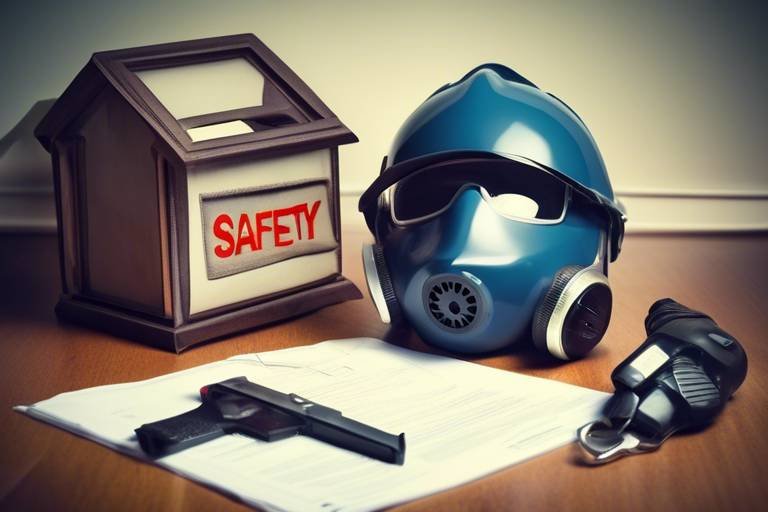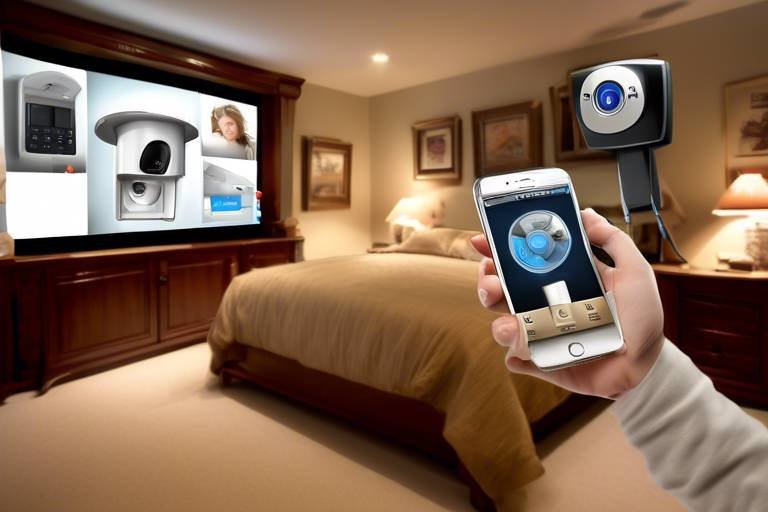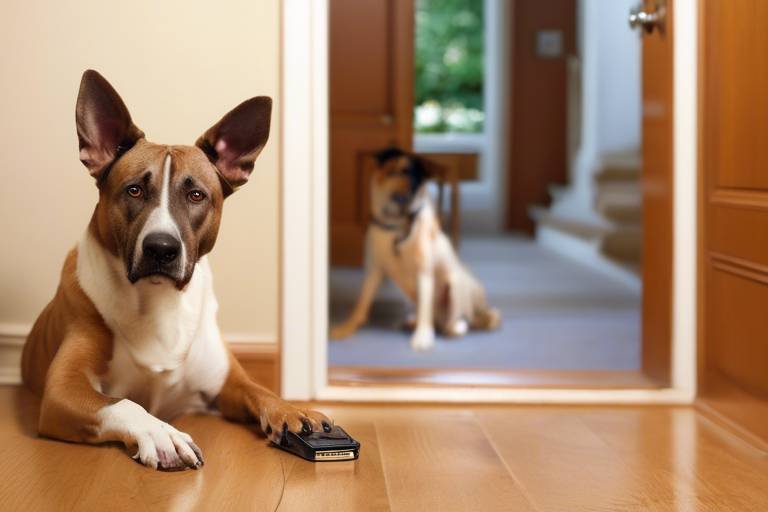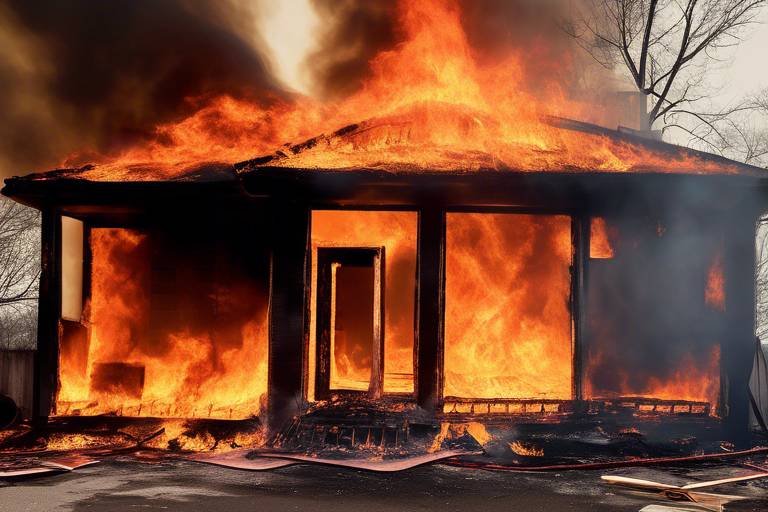Security Considerations for Home Additions or Renovation
When it comes to home additions or renovations, security is often an afterthought. However, it should be at the forefront of your planning process. Imagine this: you’re excitedly adding a new room, but during the chaos of construction, your home becomes a target for thieves. It’s a nightmare scenario, right? By taking the time to consider security measures, you can ensure that your property remains safe and secure throughout the renovation process and beyond.
First and foremost, it’s essential to assess the vulnerabilities of your current home. Every house has weak points, whether it’s a backdoor that doesn’t lock properly or windows that are easy to access. Before you start swinging hammers and laying down floors, take a good look around your property. Are there areas that could use some reinforcement? Perhaps your garage door is a bit flimsy or your backyard lacks adequate lighting. Identifying these vulnerabilities early on can save you a lot of headaches later.
As you dive into your renovation plans, consider the materials you’ll be using. The right choices can significantly enhance your home’s security. For instance, opting for reinforced doors and impact-resistant windows can be game-changers. These materials not only improve your home’s aesthetic appeal but also act as formidable barriers against potential intruders. It’s like putting on armor for your home—protecting it from the elements and unwelcome guests alike.
Furthermore, integrating security systems into your renovation plans is a smart move. With advancements in technology, there are numerous options available, from smart locks to comprehensive alarm systems. Imagine being able to monitor your home from your smartphone while you’re at work or on vacation. That peace of mind is invaluable. Security should be as much a part of your renovation as the paint color or flooring choices.
In the following sections, we’ll delve deeper into how to assess vulnerabilities, choose secure materials, and integrate cutting-edge security systems into your home renovation. So, let’s get started on making your home not just beautiful, but also a fortress!
Identifying potential vulnerabilities in your home before beginning renovations is crucial. This section discusses how to evaluate your property’s weak points and implement strategies to enhance security during the renovation.
The selection of materials plays a significant role in the security of your home addition. Here, we explore various materials that provide enhanced security features, such as reinforced doors and windows.
Installing impact-resistant windows can significantly increase your home’s security. These windows are designed to withstand extreme weather conditions and deter break-ins. Think of them as the superhero of your home’s defenses. Not only do they protect against intruders, but they also guard against harsh elements like hurricanes and heavy storms.
In addition to impact-resistant glass, proper locking mechanisms and reinforcements are essential. A window is only as secure as its locks. Upgrading to high-quality locks can make a world of difference. Consider adding window bars or security film to further enhance protection. It’s all about layering your defenses.
The choice of window frames also impacts security. Some materials, like vinyl and fiberglass, offer better resistance against forced entry compared to traditional wood frames. When selecting your frames, think of them as the foundation of your window’s security. The stronger the frame, the harder it is for an intruder to gain access.
Ensuring that entry points are secure is vital during renovations. Reinforcing doors and gates can prevent unauthorized access. Consider installing solid wood or metal doors, which are more difficult to breach than hollow-core options. Additionally, adding deadbolts and peepholes can enhance security, allowing you to see who’s at your door before opening it.
Incorporating security systems into your renovation plans can provide peace of mind. Today’s technology offers a range of options that can be tailored to your needs. From motion sensors to surveillance cameras, there’s a solution for every homeowner.
Smart home technology offers innovative solutions for enhancing security. Imagine being able to lock your doors remotely or receive alerts when someone enters your property. Smart locks and cameras provide convenience and security, making them a must-have for modern renovations.
Installing a reliable alarm system is fundamental for home security. Various types of alarm systems are available, from basic setups to advanced monitoring services. Integrating these systems into your renovation can ensure that your home is protected 24/7, giving you the freedom to enjoy your new space without worry.
- What are the best materials for securing windows? Impact-resistant glass, reinforced frames, and high-quality locks are recommended.
- How can I assess the vulnerabilities in my home? Conduct a thorough inspection of entry points, lighting, and existing security measures.
- Are smart security systems worth the investment? Yes! They offer convenience, real-time monitoring, and enhanced security features.
- What type of door is best for security? Solid wood or metal doors with deadbolts provide the best security.

Assessing Vulnerabilities
Before diving into the exciting world of home renovations, it's essential to take a step back and assess the vulnerabilities of your property. Think of your home as a fortress; if there are cracks in the walls, the enemy can sneak in. Identifying these weak points not only helps you fortify your home but also ensures that your renovation process goes smoothly without compromising your security.
Start by conducting a thorough walkthrough of your property. Look for areas that may be easily accessible to intruders, such as poorly lit corners or unsecured windows. Pay special attention to the following common vulnerabilities:
- Entry Points: Doors and windows are the primary access points for intruders. Are your doors solid and well-secured? Are your windows easily opened from the outside?
- Landscaping: Overgrown bushes or trees can provide cover for someone looking to break in. Trim back any foliage that obstructs visibility.
- Garage and Outbuildings: Don’t forget about your garage and any sheds. These areas often contain tools and equipment that can be used to break into your home.
Once you've identified these vulnerabilities, it’s time to implement strategies to enhance security. For instance, consider installing motion-sensor lights around your property to illuminate dark areas, making it less appealing for potential intruders. Additionally, you could reinforce entry points with high-quality locks and consider adding security cameras that can monitor activity around your home.
Another effective strategy is to engage with your community. Talk to your neighbors about their experiences and any security measures they have in place. A neighborhood watch program can be a great way to keep an eye on each other's properties. Remember, a united community is a safer community!
In the end, assessing vulnerabilities is not just about identifying weaknesses; it’s about taking proactive steps to protect your home during the renovation process and beyond. By addressing these concerns early on, you can ensure that your home remains a safe haven while you embark on your exciting renovation journey.

Choosing Secure Materials
When it comes to enhancing the security of your home during renovations or additions, choosing the right materials is paramount. Think of your home as a fortress; the stronger the walls and barriers, the safer you feel inside. But how do you select materials that not only look good but also provide that much-needed layer of security? Let's dive into some options that can fortify your home while keeping it stylish.
One of the first considerations is the type of doors and windows you plan to install. These are the primary entry points for potential intruders, so investing in reinforced doors and impact-resistant windows can make a world of difference. For instance, a solid wood or metal door is much harder to breach than a hollow-core door. Similarly, windows made with laminated glass can withstand significant force compared to standard glass.
In addition to doors and windows, the materials used for frames and locks are crucial. For window frames, consider materials like fiberglass or aluminum, which offer durability and resistance to tampering. Not only do these materials provide strength, but they also enhance the aesthetic appeal of your home. When it comes to locks, opt for high-security options that utilize advanced technology, such as smart locks that allow you to monitor access remotely. This way, you can keep an eye on who enters and exits your home, even when you're not there.
Another essential aspect to consider is the roofing materials. A sturdy roof not only protects you from the elements but can also deter intruders. Metal roofing, for instance, is not only long-lasting but also difficult to penetrate. Additionally, consider installing roof vents that are secured with mesh to prevent unwanted access while still allowing for ventilation.
Let’s not forget about the importance of fencing and gates. A well-constructed fence can serve as a physical barrier and a psychological deterrent for would-be intruders. Materials like wrought iron or vinyl are excellent choices that provide both strength and style. Pairing these with a robust gate and high-quality locks will further enhance your property's security.
To summarize, here are some key secure materials to consider for your home renovations:
- Doors: Solid wood or metal doors
- Windows: Impact-resistant glass and sturdy frames
- Locks: High-security and smart locks
- Roofing: Durable metal roofing
- Fencing: Wrought iron or reinforced vinyl
Ultimately, the materials you choose should not only align with your security needs but also reflect your personal style. By carefully selecting secure materials, you can create a home that is not only beautiful but also a safe haven for you and your loved ones.

Impact-Resistant Windows
When it comes to enhancing the security of your home, are a game-changer. These windows are designed not just to beautify your space but also to provide an additional layer of protection against both break-ins and severe weather conditions. Imagine living in a home where you don’t have to worry about the next storm or an unexpected intruder. That’s the peace of mind that impact-resistant windows can offer.
So, what makes these windows so special? First off, they are constructed with a durable combination of materials that can withstand significant force. Typically, they feature a layer of polyvinyl butyral (PVB) sandwiched between two sheets of glass. This unique design not only prevents shattering but also makes it incredibly difficult for an intruder to gain access. Think of them as the superheroes of your home’s exterior—standing guard against whatever Mother Nature or would-be burglars throw at them.
Moreover, the benefits of impact-resistant windows extend beyond just security. They also offer excellent insulation, which can help reduce your energy bills. By keeping your home cooler in the summer and warmer in the winter, these windows can save you money while enhancing your comfort. It’s like getting a two-for-one deal: enhanced security and energy efficiency!
Here are some key advantages of installing impact-resistant windows:
- Deterrent Against Break-Ins: Their robust construction makes it difficult for intruders to break in.
- Weather Resilience: They can withstand high winds, hail, and flying debris, making them ideal for storm-prone areas.
- Noise Reduction: The layered design significantly reduces outside noise, creating a more peaceful home environment.
- UV Protection: They block harmful UV rays, protecting your furniture and flooring from fading.
In conclusion, if you're considering a home renovation, investing in impact-resistant windows is a wise choice. Not only do they enhance your home’s security, but they also provide a myriad of other benefits that make your living space more enjoyable and efficient. So, why not take this opportunity to fortify your home while also making it more comfortable?
1. Are impact-resistant windows more expensive than regular windows?
Yes, they typically come with a higher upfront cost due to their specialized materials and construction. However, the long-term savings on energy bills and potential damage repairs can make them a cost-effective option.
2. Can I install impact-resistant windows myself?
While some homeowners may attempt DIY installation, it’s highly recommended to hire professionals. Proper installation is crucial for ensuring the windows perform as intended.
3. Do impact-resistant windows come in different styles?
Absolutely! They are available in various styles and designs, allowing you to maintain your home’s aesthetic while enhancing security.
4. How do I maintain impact-resistant windows?
Maintenance is similar to regular windows. Regular cleaning and occasional inspections for any damages will keep them in top shape.

Window Locks and Reinforcements
When it comes to securing your home, play a pivotal role in enhancing safety. Think of your windows as the eyes of your home; if they’re not protected, they can easily become the entry point for intruders. It’s essential to consider not just the glass but also the mechanisms that keep your windows shut tight. A window without a proper lock is like a door left wide open, inviting unwanted guests. So, let’s dive into what makes for robust window security!
First off, let’s talk about the types of window locks available. There are various locking mechanisms you can choose from, each offering different levels of security. For instance, traditional sash locks are common but may not be sufficient for modern security needs. Instead, consider opting for keyed locks or multi-point locking systems. These systems secure your window at multiple points along the frame, making it significantly harder for anyone to force their way in. Here’s a quick breakdown of some popular lock types:
| Lock Type | Security Level | Best For |
|---|---|---|
| Single Sash Lock | Low | Standard windows |
| Keyed Lock | Medium | Sliding windows |
| Multi-Point Lock | High | Casement windows |
| Window Pin Lock | Medium | Double-hung windows |
But locks alone aren’t enough; you also need to consider reinforcements. Adding window security film can be an excellent way to bolster your defenses. This film makes the glass more resistant to shattering, meaning even if someone tries to break in, they’ll have a much harder time doing so. It’s like putting a shield on your windows! Additionally, consider installing window bars or grilles. While they may not be the most aesthetically pleasing option, they can serve as a formidable barrier against intruders.
Another effective reinforcement technique is the installation of hinge locks on windows that open outward. These locks secure the hinges, making it nearly impossible for someone to lift the window off its frame. It’s a simple yet effective solution that adds an extra layer of security. Remember, the goal is to make it as difficult as possible for an intruder to enter your home.
In summary, investing in high-quality window locks and reinforcements is a crucial step in securing your home. By combining effective locking mechanisms with additional reinforcements, you can significantly reduce the risk of break-ins. After all, your home should be a sanctuary, not just a structure. So, don’t overlook this vital aspect of your renovation plans—your peace of mind is worth it!
- What type of window lock is the most secure? Multi-point locking systems are generally considered the most secure, as they lock the window at multiple points.
- Are window security films effective? Yes, window security films can significantly enhance the shatter resistance of glass, making it harder for intruders to break in.
- Do I need to reinforce all my windows? It’s advisable to reinforce windows that are easily accessible or are located on the ground floor.
- Can I install window locks myself? Many window locks can be installed by homeowners with basic tools, but for complex systems, professional installation may be recommended.

Choosing the Right Frames
When it comes to enhancing the security of your home addition, the choice of window frames is a critical factor that often goes overlooked. You might think that the glass is the most important part, but the frame plays a vital role in overall security. Just as a sturdy foundation supports a house, a robust frame supports the window and provides added protection against intrusions. So, what should you look for when choosing the right frames?
First off, consider the material of the window frames. Different materials offer varying levels of strength and durability. Some of the most common materials include:
- Vinyl: Known for its resistance to weather and rot, vinyl frames are lightweight yet durable. However, they may not provide the same level of security as other materials.
- Aluminum: Aluminum frames are strong and can withstand significant force. They are also resistant to rust, making them a popular choice for security.
- Wood: While wooden frames can be aesthetically pleasing, they may require more maintenance to prevent decay. However, when treated properly, they can offer decent security.
- Fiberglass: This is a newer option that combines the best of both worlds—strength and energy efficiency. Fiberglass frames are highly resistant to warping and can provide excellent security.
Now, it’s not just about the material; the design of the frame also matters. A well-designed frame can significantly enhance the security of your windows. For instance, frames that are designed to be multi-chambered can offer better insulation and strength, making them harder to break. Additionally, frames with reinforced corners and locking mechanisms provide an extra layer of security. Think of it like a well-built fortress; every layer counts!
Another aspect to consider is the frame’s compatibility with impact-resistant glass. If you’re investing in high-quality glass, you’ll want a frame that can handle the added weight and pressure. Some manufacturers offer frames specifically designed to work in tandem with impact-resistant glass, ensuring that your windows are both stylish and secure.
Lastly, don’t forget about aesthetics! The right frame can enhance the overall look of your home. After all, security shouldn’t come at the cost of style. Fortunately, many manufacturers now offer a variety of colors and finishes, allowing you to choose frames that complement your home’s design while still prioritizing security.
In summary, choosing the right frames for your windows is a multifaceted decision that involves weighing material strength, design, compatibility with security features, and visual appeal. By taking the time to evaluate these factors, you can ensure that your home addition not only looks great but also stands strong against potential threats.
- What materials are best for window frames in terms of security? Aluminum and fiberglass are typically the strongest options, while vinyl and wood may require additional reinforcements.
- How do I know if my window frames are secure enough? Look for frames that are reinforced and designed to work with impact-resistant glass, and ensure they have robust locking mechanisms.
- Can I upgrade my existing window frames? Yes, you can replace or reinforce existing frames to enhance security. Consult with a professional for the best options.

Secure Entry Points
When it comes to home security, entry points are your first line of defense. Think of your home as a castle; if the gates are weak, it doesn't matter how strong your walls are. During renovations, it’s essential to ensure that all entry points—doors, windows, and gates—are fortified against potential intruders. Start by evaluating the current state of your doors and windows. Are the locks outdated? Is the frame rotting? These are signs that it's time for an upgrade.
One effective strategy is to install solid-core doors instead of hollow ones. Solid-core doors provide a much stronger barrier and are less likely to be kicked in. Additionally, consider upgrading to high-security locks that are more resistant to picking and bumping. A good lock is like a strong shield—it's there to protect you and your loved ones from unwanted guests.
Don't overlook your windows either. Reinforcing window frames with materials such as steel or aluminum can significantly enhance their resistance to break-ins. Pairing these frames with impact-resistant glass not only protects against intruders but also shields your home from severe weather conditions. Imagine your home standing tall against a storm while keeping intruders at bay—this is the dual benefit of investing in quality materials.
Another aspect to consider is the installation of security screens or grilles. These can be particularly useful for ground-level windows and doors, acting as an additional layer of protection without compromising your home’s aesthetic appeal. Think of them as a modern-day moat; they provide a deterrent while still allowing you to enjoy the view.
Lastly, always remember that the placement of entry points matters. If possible, install doors and windows in well-lit areas or near motion-activated lights. This not only enhances visibility but also discourages potential intruders who prefer to operate under the cover of darkness. It’s like putting a spotlight on your home’s defenses—making it clear that you take security seriously.
In summary, securing your entry points during renovations is not just about adding locks or screens; it’s about creating a comprehensive strategy that combines quality materials, proper installation, and smart design choices. By doing so, you’ll transform your home into a fortress—one that protects you and your family from the unexpected.
- What types of doors are best for security? Solid-core doors, especially those made from steel or fiberglass, are the most secure options.
- How can I reinforce my windows? Consider installing impact-resistant glass and using sturdy frames made from aluminum or steel.
- Are security screens worth the investment? Yes, they provide an additional layer of protection without sacrificing aesthetics.
- What should I look for in a lock? Look for high-security locks that resist picking and bumping, and consider deadbolts for added strength.

Integrating Security Systems
When it comes to home renovations, one of the most crucial aspects to consider is how to integrate security systems effectively. This not only ensures your home remains safe during the construction phase but also provides long-term security benefits once the project is complete. Imagine the peace of mind that comes with knowing your home is equipped with the latest technology to deter intruders and alert you to any suspicious activity. So, how do you go about incorporating these systems into your renovation plans?
First off, it’s essential to start with a comprehensive assessment of your home’s security needs. Think of this as creating a personalized security blueprint tailored to your lifestyle and the unique vulnerabilities of your property. For instance, if your home has large windows or multiple entry points, you might want to consider a combination of alarm systems, cameras, and smart home integrations. Each of these elements plays a vital role in creating a cohesive security strategy.
One of the most popular choices today is the integration of smart home security features. These systems allow you to monitor your home remotely, giving you the ability to control locks, cameras, and alarms from your smartphone. Imagine being able to check your security cameras while on vacation, or receiving instant notifications if someone is at your door. This level of control not only enhances your security but also offers a sense of empowerment. Smart locks, for instance, can be programmed to allow access only to specific individuals, and you can easily change codes when necessary.
Next, let’s talk about alarm systems and monitoring. Installing a reliable alarm system is fundamental for home security. There are various types of alarm systems available, ranging from basic setups that alert you to intrusions to more advanced systems that include environmental monitoring for smoke, carbon monoxide, and even flooding. Many modern systems come with 24/7 professional monitoring services, meaning that if an alarm is triggered, a team of experts will respond immediately. This could be the difference between a minor incident and a significant loss.
To make the most of your renovation, consider integrating these systems during the construction phase. This approach not only saves you time and money but also allows for a more seamless installation. For example, wiring for security cameras can be done alongside electrical work, ensuring that everything is neatly hidden and functional from day one. Additionally, many security systems now offer DIY installation options, making it easier than ever to set up your security features without needing a professional.
In conclusion, integrating security systems into your home renovation is not just an afterthought; it’s a vital component that enhances the safety and security of your property. By carefully selecting the right systems and planning their installation during the renovation process, you can create a secure haven that protects your home and loved ones. Remember, investing in security is investing in peace of mind.
- What types of security systems are best for home renovations?
Choosing a combination of smart locks, alarm systems, and security cameras is often the most effective approach. - Can I install security systems myself?
Yes, many modern systems offer DIY installation options, making it simple for homeowners to set up. - How do smart home features enhance security?
Smart home features allow for remote monitoring and control, providing real-time alerts and access management.

Smart Home Security Features
In today's digital age, have revolutionized the way we protect our homes. Imagine having the ability to monitor your property in real-time, no matter where you are. With smart technology, this is not just a dream; it's a reality! These features not only enhance security but also offer convenience and peace of mind. But what exactly do these smart systems entail? Let's dive in!
One of the standout components of smart home security is the smart lock. Unlike traditional locks, smart locks can be controlled remotely through your smartphone. This means you can lock or unlock your doors from anywhere, which is perfect for those unexpected guests or service providers. Plus, many smart locks come with features like temporary access codes, allowing you to grant entry to visitors without needing to be physically present. This is a game-changer, especially if you're managing a busy household!
Another exciting feature is the smart camera. These cameras can be placed around your property to provide comprehensive surveillance. Most models come equipped with motion detection, night vision, and two-way audio, enabling you to see and communicate with anyone at your doorstep from your smartphone. Imagine being able to greet your delivery person or check on your pets while you’re at work, all thanks to these nifty devices!
But it doesn't stop there. Integrating a smart security system into your renovation plans can create a network of devices that work together seamlessly. For instance, when a motion sensor detects movement, it can trigger your smart lights to turn on, illuminating the area and deterring potential intruders. This interconnectedness not only enhances security but also adds a layer of automation that makes your life easier.
Additionally, many smart home security systems offer cloud storage options for video footage. This means you can access recorded clips anytime, providing you with valuable evidence in case of an incident. Some systems even offer AI features that can differentiate between a person and a pet, reducing unnecessary alerts and giving you a clearer picture of what’s happening around your home.
It's important to note that while these smart features are incredibly beneficial, they also require a reliable internet connection. If your Wi-Fi drops, so does your access to your home security. Therefore, investing in a robust internet setup is crucial for maximizing the effectiveness of these smart technologies.
In summary, integrating into your renovation not only enhances the safety of your home but also adds a layer of convenience that traditional systems simply can't match. From smart locks to cameras and interconnected devices, the possibilities are endless. So, as you plan your home addition or renovation, consider how these innovative technologies can fit into your security strategy. Your future self will thank you!
Q: Are smart home security systems easy to install?
A: Most smart home security systems are designed for easy installation, often requiring minimal tools and no professional help. However, complex systems might benefit from professional installation.
Q: Can I control my smart security devices when I'm away from home?
A: Yes! Smart security devices can be controlled remotely via smartphone apps, allowing you to monitor and manage your home security from anywhere.
Q: What happens if my Wi-Fi goes down?
A: If your Wi-Fi goes down, you may lose access to your smart devices temporarily. Some systems have local storage options that continue to record even without an internet connection.
Q: Are smart locks secure?
A: Yes, smart locks are generally considered secure, especially those that use encryption and have robust security features. However, it’s essential to choose reputable brands and regularly update your passwords.

Alarm Systems and Monitoring
When it comes to ensuring your home remains a fortress during renovations, alarm systems are your frontline defenders. Imagine this: you’re in the middle of a renovation, with tools scattered and windows open. The last thing you want is to worry about the safety of your belongings or the integrity of your home. That’s where a robust alarm system comes into play. Not only do these systems provide a deterrent against intruders, but they also offer you peace of mind, knowing that your home is protected 24/7.
Modern alarm systems come equipped with various features that make them more effective than ever. For instance, many systems now include motion detectors, which can alert you to any unusual activity while you’re away. These detectors can be as sensitive as a hawk’s eye, ensuring that even the slightest movement triggers a response. Additionally, many systems can be integrated with your smartphone, allowing you to monitor your home in real-time, no matter where you are. Isn’t it reassuring to know you can check in on your home with just a tap on your phone?
One of the most compelling benefits of installing an alarm system during your renovation is the ability to customize it according to your specific needs. Whether you want to include door sensors, glass break detectors, or even video surveillance, the choice is yours. Here's a quick overview of some of the most popular types of alarm systems:
| Type of Alarm System | Features | Best For |
|---|---|---|
| Wired Alarm Systems | Reliable, requires professional installation | Permanent homes |
| Wireless Alarm Systems | Easy installation, flexible placement | Renters or temporary homes |
| Smart Alarm Systems | Remote access, integration with smart devices | Tech-savvy homeowners |
Moreover, many alarm systems now offer the option of professional monitoring. This means that if your alarm is triggered, a team of professionals will be alerted and can respond swiftly. Think of it as having a personal security team on standby, ready to spring into action at a moment’s notice. This level of vigilance can be especially important during renovations when the house is more vulnerable.
Lastly, it’s essential to consider the installation process of your alarm system. While some systems are DIY-friendly, others may require professional installation to ensure they function correctly. A well-installed system can mean the difference between a minor inconvenience and a major security breach. So, take the time to research and choose a reputable installer if you opt for a wired or more complex system.
In conclusion, integrating an alarm system into your home renovation is not just an afterthought; it's a vital step in safeguarding your property. With the right system in place, you can focus on your renovations without the constant worry of potential threats. Remember, security is not just about preventing break-ins; it’s about creating an environment where you feel safe and at ease in your own home.
- What type of alarm system is best for my home? It depends on your specific needs; consider factors like home size, layout, and whether you want smart features.
- Do I need professional installation? While some systems are easy to install yourself, professional installation is recommended for complex setups.
- Can I monitor my alarm system remotely? Yes, many modern alarm systems offer smartphone apps for real-time monitoring.
- What happens if my alarm goes off? If you have professional monitoring, they will assess the situation and notify the authorities if necessary.
Frequently Asked Questions
- What are the key security considerations when planning home renovations?
When planning home renovations, it's essential to assess your property's vulnerabilities, choose secure materials, and ensure that entry points are well-protected. By identifying weak spots and implementing security measures, you can significantly enhance the safety of your home during and after the renovations.
- How can I identify vulnerabilities in my home before renovations?
Start by conducting a thorough inspection of your home. Look for areas that may be easily accessible to intruders, such as old doors, windows without locks, or poorly lit areas. Consider consulting a security professional for a detailed assessment and recommendations on reinforcing these vulnerable points.
- What materials should I consider for enhanced security in home additions?
Opt for materials that offer durability and strength, such as impact-resistant windows and reinforced doors. Additionally, consider secure window frames made from strong materials like vinyl or aluminum, which can provide extra protection against break-ins.
- Are impact-resistant windows worth the investment?
Absolutely! Impact-resistant windows not only deter break-ins but also withstand severe weather conditions, providing a dual benefit. They can save you money on repairs in the long run and enhance your home's overall security.
- How can I secure my entry points during renovations?
Reinforce doors with deadbolt locks, and consider installing security gates. Ensure that all entry points are monitored, and if possible, use temporary security measures like door alarms or surveillance cameras to keep an eye on the area while work is being done.
- What types of security systems should I integrate into my renovation plans?
Look into alarm systems, surveillance cameras, and smart home integrations. These technologies not only enhance security but also provide convenience, allowing you to monitor your home remotely and receive alerts in real-time.
- What are the benefits of smart home security features?
Smart home security features offer convenience, control, and enhanced safety. With smart locks and cameras, you can monitor your home from anywhere, receive instant alerts about suspicious activity, and even control access remotely, ensuring your property is always secure.
- How do alarm systems contribute to home security during renovations?
Alarm systems act as a deterrent to intruders and can alert you and authorities in case of unauthorized access. Integrating these systems during renovations ensures that your home remains protected throughout the construction process and beyond.





